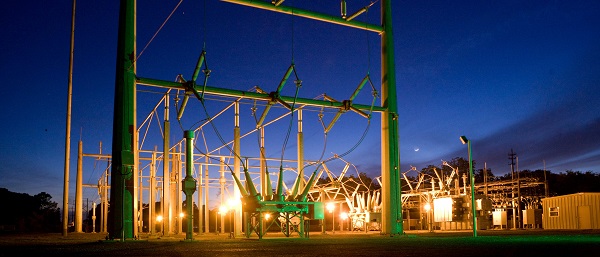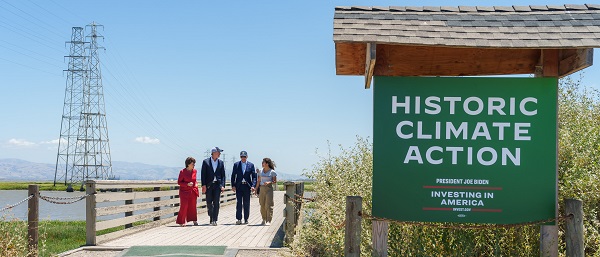Energy
Federal Greenwash law: guilty until proven innocent

From Resource Works
“Under this new law, you’re guilty unless you prove your innocence to some back-room bureaucratic body. That’s simply not a Canadian concept.”
In its latest display of environmental correctness, the federal government passed a new anti-greenwashing law that requires individuals or organizations making claims or promises about the climate benefits of products or processes to prove their truth.
Such “truth,” the law stipulates, must be proven to the satisfaction of a federal bureaucracy — by way of “an adequate and proper test” or “adequate and proper substantiation in accordance with internationally recognized methodology.”
However, those tests and methodologies have not been defined or announced, remaining hopelessly vague. A federal bureaucrat is now empowered under the law to review such climate statements and claims, and to compel court proceedings if they deem them not to meet the ambiguous criteria.
It’s clear the law (Bill C-59, amendments to the Competition Act) would apply to companies claiming, for example, that their production processes or new technologies will reduce greenhouse gas emissions. However, the Competition Bureau conveniently will not have to prove that the claims are false or misleading. The new law instead requires the accused company or agency to prove their innocence.
The penalties can be severe, with fines of up to $10 million ($15 million for repeat offenders) or as much as three times the benefit derived from the misrepresentation. If that benefit cannot be reasonably determined, the penalty could be up to three percent of the company’s annual worldwide gross revenues.
Canada is thus following the green correctness of the European Parliament, which now requires “proof” of claims of a neutral, reduced, or positive impact on the environment when a producer reduces or offsets emissions.
The European Union’s move followed a study by the European Commission, which found more than half of green claims were vague, misleading, or unfounded, with 40% being “completely unsubstantiated.”
Industry in Canada has been quick to protest Bill C-59, and it’s not just the oil and natural gas sector raising concerns. Industries ranging from automotive to mining to manufacturing are also challenging the new law.
Dennis Darby, CEO of the Canadian Manufacturers & Exporters Association, called the changes “quite heavy-handed” and said his member companies worry about potential legal challenges over any environmental claims they make about emissions-reducing technologies.
The Canadian Association of Petroleum Producers (CAPP) also protested: “These amendments effectively silence discussion around climate and environmental policy for political gains, while promoting the voices of those most opposed to Canada’s oil and natural gas sector.
“The federal government’s approach to these amendments has introduced a new level of complexity and risk for those looking to invest in Canada. The amendments to the Competition Act will make it more difficult for proponents to speak to Canadians and gain public support for their projects, particularly for those focused on reducing emissions.”
CAPP argued in a submission to the Competition Bureau: “The effect of this legislation is to silence the energy industry and those that support it, in an effort to clear the field of debate and promote the voices of those most opposed to Canada’s energy industry.
“Implementing a vague law with exceptionally high penalties, without consultation, and with an outsized impact on the country’s largest industries, is both anti-democratic and anti-business.”
Will the new Canadian law also apply (as CAPP says it should) to climate campaigners and green groups who claim that a company, product, or process damages the global climate?
One green group recently attacked liquefied natural gas (LNG) developments in British Columbia using (among other things) a photoshopped image of a smoke-emitting oil and gas facility in Iran. Could that be prosecuted under the new law? It should be, but who knows?
Will the new reverse-onus law apply in practice to government departments, ministries, and ministers? Again, who knows?
The federal Canada Energy Regulator, for example, made a number of green statements in a recent Market Snapshot about LNG in BC:
- “LNG Canada is actively working on electrifying certain processes, especially for the proposed Phase 2. This shift will reduce reliance on fossil fuels and help lower the carbon intensity of LNG production.”
- “Woodfibre LNG will use electric motors powered by renewable electricity from B.C. Hydro, making the project one of the lowest-emission LNG export facilities in the world.”
- “The proposed Cedar LNG facility will also be powered by renewable electricity from B.C. Hydro and will be one of the lowest-emission LNG facilities in the world.”
- “The proposed Ksi Lisims LNG facility would have one of the lowest carbon intensities of large-scale LNG export projects in the world, utilizing several technologies to reduce carbon emissions, including renewable hydropower from the B.C. electricity grid.”
- “The Tilbury LNG facility is powered by renewable hydroelectricity, which means it can produce LNG that is nearly 30 percent less carbon-intensive than the global average.”
Does the Canada Energy Regulator now have to “prove” all those statements?
And what about Prime Minister Trudeau himself? The First Nations LNG Alliance (which has said the law could be used as one more tool to discourage Indigenous partnerships and investment in energy projects) asked if the law would apply to the prime minister.
“Prime Minister Justin Trudeau hailed the go-ahead decision by the Cedar LNG project, majority-owned by the Haisla First Nation in B.C. He said it will be ‘the world’s lowest carbon footprint LNG facility.’ So does the prime minister now have to ‘prove’ that Cedar LNG is the world’s lowest carbon footprint LNG facility?”
Regardless, under this new law, you’re guilty unless you prove your innocence to some back-room bureaucratic body. That’s simply not a Canadian concept, nor a Liberal one. This new law needs to be changed or repealed.
Business
Finance Titans May Have Found Trojan Horse For ‘Climate Mandates’


From the Daily Caller News Foundation
By Audrey Streb
Major global asset managers including BlackRock and Blackstone have been looking to buy power utilities across America in a move that some industry insiders warn could harm consumers, raise electricity costs and advance a climate-driven energy agenda.
In recent months, Blackstone reportedly sought regulatory approval to buy utilities in New Mexico and Texas all while a BlackRock-led group won approval Friday to purchase a major utility in Minnesota. While BlackRock and other huge asset managers have distanced themselves from environmental, social and governance (ESG) investment practices in recent years, some energy experts and consumer advocates that spoke to the Daily Caller News Foundation are concerned that buying up utilities may represent a new frontier of financial giants orchestrating “climate mandates.”
“BlackRock isn’t just influencing utilities anymore, they’re buying them. After years of ESG-driven coercion that pushed utilities to abandon reliable energy in favor of China-dependent renewables, BlackRock is now taking direct control. The result will be more of the same: higher costs, weaker grids, and millions in unpaid bills, all driven by the very climate mandates they lobbied for,” Jason Isaac, CEO of the American Energy Institute, told the DCNF. “Minnesotans should brace for more unreliable power, rising rates, and a media narrative that blames Trump for ending taxpayer-funded handouts instead of holding the woke politicians and Wall Street elites responsible for the crisis.”
Electricity demand is on the rise after years of stagnancy as the artificial intelligence (AI) race ushers in the build out of power-hungry data centers. Utility costs are also spiking as demand takes off in a trend that dates back to the Biden administration.
Against this backdrop, private investment titans like BlackRock and Blackstone are reportedly moving to buy power utility companies and invest in data center expansions and startups.
Minnesota recently granted the BlackRock-led group known as Global Infrastructure Partners (GIP) approval to buy one of the state’s major power utilities, Allete. GIP is also reportedly on the cusp of acquiring the major energy company, AES, according to sources familiar with the matter that spoke with Reuters. The Financial Times reported that the deal may be for $38 billion.
BlackRock referred the DCNF to Allete’s statement on regulators approving its partnership with GIP and declined to comment further for this story.
Allete’s statement notes that the impending partnership with the BlackRock-led group includes “guaranteed access to capital to fund ALLETE’s five-year plan for advancing transmission and renewable energy goals [and a] $50 million Clean Firm Technology Fund to support regional clean-energy projects and partnerships.”
The Federal Energy Regulatory Commission (FERC) renewed BlackRock’s ability to own up to 20% of utility voting shares in April, with former FERC Commissioner Mark Christie stating that BlackRock “pledged not to use its holdings to influence utility management” and that utilities need the access to capital.
Christie also warned in September 2024 that “this is an issue that deserves much greater scrutiny” and that “the influence that large shareholders, BlackRock or otherwise, can potentially exert across the consumer-serving utility industry should not be underestimated.”
Blackstone has reportedly sought regulatory approval to buy out the Public Service Company of New Mexico and Texas New Mexico Power Co. recently, according to The Associated Press. The asset management giant also secured a 19.9% stake in a Northern Indiana public utility for over $2 billion in January 2024.
“Blackstone’s sustainability strategy prioritizes accelerating decarbonization by investing in the energy transition and driving value accretive emissions reduction in our portfolio,” Blackstone’s 2024 sustainability report states. “We believe the transition to cleaner energy creates meaningful investment opportunities for private capital. For over a decade, we have pursued attractive investments in companies and assets that are part of the global energy transition as part of our broader energy investing strategy.”
Blackstone also announced on Sept. 15 that private equity funds affiliated with Blackstone Energy Transition Partners will acquire the Pennsylvania-based Hill Top Energy Center natural gas plant for almost $1 billion. The company also announced in July that funds managed by Blackstone Infrastructure and Blackstone Real Estate would invest over $25 billion to help build out Pennsylvania’s energy infrastructure to support the AI “revolution.”
“Renewable” energy goals and ESG investment tend to align with emissions-reduction targets, with some power companies, utilities and states that set goals to cut emissions striving to retire conventional energy sources like coal plants. Isaac added that companies like American Electric Power, in which BlackRock owns a significant stake, have been decommissioning coal plants and replacing them with intermittent sources like solar.
“What happens is when the wind stops blowing and the sun stops shining, then you have to ramp those generational assets back up, and that’s when price spikes happen,” Isaac said.
University of North Carolina at Chapel Hill professor of finance Greg Brown told the AP that the reason behind these buyouts are “very simple. Because there’s a lot of money to be made.”
Other experts devoted to consumer protection like Executive Director of Consumers’ Research Will Hild told the DCNF that investment companies like BlackRock stand to gain more than just a profit from these purchases.
“There is no world in which BlackRock’s ownership of American energy benefits ordinary American consumers,” Hild told the DCNF. “This is the same firm that proudly brought us the radical ESG rules and Net-Zero nonsense that forced all our energy bills to skyrocket. We wouldn’t have the scourge of woke capitalism without Larry Fink, who already controls nearly $13 trillion in assets and has been sued for violating anti-trust laws.”
ESG investors weigh a company by its social and environmental choices as well as its finances in a move that critics say bogs down businesses with new costs while doing little to combat climate change. One August 2023 InfluenceMap report showed that as Republicans at the state level and in Congress ramped up their opposition to ESG-focused practices, BlackRock and other major U.S. asset managers decreased their support for climate-related resolutions.
BlackRock CEO Larry Fink also said in June 2023 that he no will no longer use the term ESG because it has been “politicized,” less than a year after he noted that climbing energy prices are “accelerating” the green energy transition.
“BlackRock has backpedaled on its ESG messaging and its aggressive, unapologetic imposition of ESG on everything they touch. But the leopard hasn’t changed its spots,” President of the Heartland Institute James Taylor told the DCNF. “It still has the same management group with the same values, and it’s still doing whatever it can to impose ESG on everything it touches, in actuality, if not in name.”
Taylor argued that whether BlackRock buys or acquires a large stake of a utility, it “can now assert itself over legislatures in dictating energy policy.”
Notably, the Federal Trade Commission (FTC) and the Department of Justice (DOJ) threw their weight behind an antitrust lawsuit against major asset managers that alleges the firms colluded to tank coal production with their embrace of zero-emissions goals in May.
The lawsuit, backed by 11 state attorneys general, alleges that BlackRock and multiple other asset managers used their market power to suppress coal production, thereby hurting consumers by causing the price of coal to climb.
The DOJ and FTC’s “support for this baseless case undermines the Trump Administration’s goal of American energy independence,” a BlackRock spokesperson previously told the DCNF. “As we made clear in our earlier motion to dismiss, this case is trying to re-write antitrust law and is based on an absurd theory that coal companies conspired with their shareholders to reduce coal production.”
Daily Caller
Utah Republican Senator Planning To Attend Big Globalist Climate Shindig Despite Trump’s Energy Policies


From the Daily Caller News Foundation
By Audrey Streb
Republican Utah Sen. John Curtis is reportedly planning to co-lead a delegation to the annual U.N. climate change conference, which some critics told the Daily Caller News Foundation clashes with President Donald Trump’s energy agenda.
Curtis told E&E News Friday that he and Democratic Delaware Sen. Chris Coons will lead a delegation to Brazil together for this year’s COP30 and that three other unnamed Republicans are also interested in joining the troop. The U.N. climate change conference is set to host several youth-led climate forums and discuss the Paris Agreement that Trump directed the U.S. to abandon through a day-one executive order.
“RINOs like Sen. Curtis are trying to snatch defeat from the jaws of MAGA victory by going to the annual UN climate confab in Brazil,” Steve Milloy, Senior Fellow at the Energy & Environment Legal Institute told the DCNF. “There, they will conspire with China and Europe in trying to subvert President Trump’s agenda of defeating the climate hoax, terminating the Green New Scam and making America energy dominant.”
Dear Readers:
As a nonprofit, we are dependent on the generosity of our readers.
Please consider making a small donation of any amount here.
Thank you!
The Trump administration has not announced that it will send a delegation to the November conference and Trump recently called climate change policy the “greatest con job ever perpetrated on the world” in front of the United Nations General Assembly in September. Trump has moved to ax federal support for green energy sources like wind and solar that the Biden administration favored while bolstering conventional resources like coal.
“Leave it to ‘Mitt Romney’ style Republicans like Sen. Curtis to try to snatch defeat from the jaws of victory. … The UN climate agenda and the UN’s COP30 meetings should be disbanded, not given credibility by GOP senators,” Marc Morano, author and Climate Depot executive editor, told the DCNF. “This is a pathetic throwback to the pre-Trump Republicanism of George H. Bush, George W. Bush, John McCain, and Mitt Romney. … The UN climate agenda has quite literally overseen the outsourcing of the West’s once dominant industries to China, India, and the developing world. The U.S., Canada, and Europe have boasted about emission accounting tricks, while China builds two new coal plants a week and benefits from the West’s attempts at a ‘green transition.’ The U.S. does not need ‘a seat at the table’ at the UN climate summit, we need to knock the table over.”
Curtis has historically split with many Republicans over climate change policy and has notably advocated against a wholesale repeal of Biden-era green energy tax credits that Trump railed against. Earlier this year, Curtis told Secretary of State Marco Rubio that it is “really important” to have a “Republican voice at that table,” in reference to COP30.
The Senator pointed to nuclear specifically as an energy resource Republicans could elevate at COP30.
Critics like Milloy, Morano and President of the Heartland Institute James Taylor told the DCNF that COP30 should not be endorsed by Republican participation as it runs counter to Trump’s energy policies and suggests that the left-leaning climate talking points the president has fought hold legitimacy.
“Republicans who attend COP30 for any reason other than to mock it are hypocrites and grandstanders,” Taylor told the DCNF. “How much carbon dioxide are they going to spew into the atmosphere merely so they can have a ‘photo op’ at a portion of the Amazon rainforest that was destroyed in order to create a venue for this vacation conference of UN bureaucrats?”
Notably, developers razed portions of the Amazon rainforest to construct a road for COP30, and a 2024 study released right before COP29 showed that emissions rise sharply during major conferences due to private jet travel.
-

 Red Deer2 days ago
Red Deer2 days agoThe City of Red Deer’s Financial Troubles: Here Are The Candidates I Am Voting For And Why.
-

 Business2 days ago
Business2 days agoCanada Post is failing Canadians—time to privatize it
-

 Business2 days ago
Business2 days agoYour $350 Grocery Question: Gouging or Economics?
-

 2025 Federal Election13 hours ago
2025 Federal Election13 hours agoProtestor Behind ‘Longest Ballot’ Chaos targeting Poilievre pontificates to Commons Committee
-

 Education2 days ago
Education2 days agoClassroom Size Isn’t The Real Issue
-

 Media2 days ago
Media2 days agoResponse to any budget sleight of hand will determine which audience media have decided to serve
-

 illegal immigration2 days ago
illegal immigration2 days ago$4.5B awarded in new contracts to build Smart Wall along southwest border
-

 Frontier Centre for Public Policy2 days ago
Frontier Centre for Public Policy2 days agoCanada’s Democracy Is Running On Fumes







